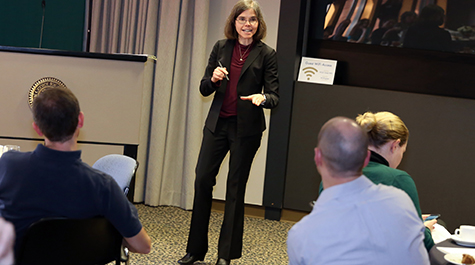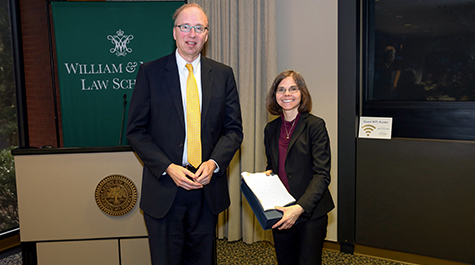Professor Tara Leigh Grove Delivers the 2020 Blackstone Lecture
“Timely, timeless and meticulous.”
That’s how Professor Aaron-Andrew Bruhl described colleague Tara Leigh Grove’s scholarship in his introduction to the 2020 Blackstone Lecture on January 16 at William & Mary Law School.
Professor Grove’s lecture more than lived up to the description. Entitled “The Fragility of Judicial Independence,” she began by recounting the story of the February 2017 travel ban enacted by President Donald Trump and the subsequent blocking of said ban by a federal court judge. The event, for Grove, illustrated a strong example of judicial independence.
Grove went on to describe two vital forms of such independence. The first is decisional, in which judges make decisions beyond partisan divides; and the second is perceived, which relies on the perception that judges are not biased in the first place.
“Both aspects are extremely important, and both may be in trouble in our current society,” Grove said.
Recent worries about court packing from both ends of the political spectrum (which according to Grove hadn’t been a serious possibility before March 2018), and “affective polarization” (in which each political party considers the other as less trustworthy) exacerbate the problem.
Grove said that Article III of the U.S. Constitution (establishing the judicial branch of the federal government) may confer judicial independence on paper, but “judicial independence depends on so much more than the text and structure of the United States Constitution; it depends on our history and norms, and our compliance with those norms.”
As an example, Grove cited the norm that presidents have long complied with federal court orders, even when they thought the orders are wrong, or if they thought federal courts lacked jurisdiction to issue them.
An absence of perceived independence makes decisional independence all the more difficult. Grove described how Chief Justice John Roberts must look over his shoulder and worry about being perceived as going too far whenever the U.S. Supreme Court considers cases with strong political and emotional pull.
The biggest question, Grove maintained, is whether or not the norms that support independence actually continue in the current political climate.
“I would suggest that the most important norm of all is believing that we care about the Constitution and our constitutional scheme,” Grove said before taking questions from her Law School colleagues.
Grove is the Mills E. Godwin, Jr. Professor of Law at William & Mary. She received her undergraduate degree summa cum laude from Duke University, and her law degree magna cum laude from Harvard Law School, where she was Supreme Court Chair of the Harvard Law Review. She clerked for Judge Emilio Garza on the U.S. Court of Appeals for the Fifth Circuit and later served for four years as an appellate attorney in the U.S. Department of Justice’s Civil Division.
Grove began her academic career at Florida State University College of Law in 2009 and joined the William & Mary Law School faculty two years later. She was a visiting professor at Northwestern University Pritzker School of Law in 2012, and served as a visiting professor at Harvard Law School in 2017.
Grove’s research focuses on the federal judiciary and the constitutional separation of powers. Her work has appeared in the Harvard Law Review, Columbia Law Review, University of Chicago Law Review, New York University Law Review, University of Pennsylvania Law Review, Cornell Law Review, and Vanderbilt Law Review, among other places.
Among other honors at William & Mary, Grove has received the Walter L. Williams, Jr., Memorial Teaching Award, two Plumeri Awards for Faculty Excellence, and the Alumni Fellowship Award.
The Blackstone Lecture Series was established in 1996 to recognize the scholarly achievements of younger members of the William & Mary Law School faculty. The series is made possible through the generosity of Law School alumni.
About William & Mary Law School
Thomas Jefferson founded William & Mary Law School in 1779 to train leaders for the new nation. Now in its third century, America's oldest law school continues its historic mission of educating citizen lawyers who are prepared both to lead and to serve.




